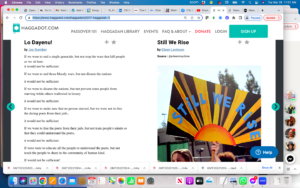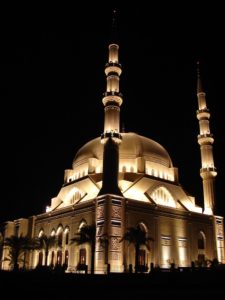“Lo Dayenu”: It is NOT Enough for Us!
Ramadan started Wednesday. Passover starts next Wednesday. Easter weekend begins two days after Passover. And today, the Wednesday halfway between the starts of these sacred Muslim and Jewish celebrations, we mourn. Again.
As a Jew, I’ll be celebrating Passover Seders next week with family and friends. Part of the Seder is a song called “Dayenu,” which means “It would have been enough for us.” The song thanks God for many miracles involving the exodus from Egypt and the journey across the desert.
Many Jews also add a second text: “Lo Dayenu”: It is NOT Enough for Us.” In the modern Midrashic tradition, lots of people have written their own versions. I like this “Lo Dayenu,” by Joy Stember.

With the six deaths in Nashville yesterday, the grisly total of people in the US killed in school mass shootings from Columbine in 1999 through yesterday has grown again. It reached 554 10 months ago. 554 children and adults who died for no reason other than a broken political process that gets in the way of even the most basic protection from gun violence. While they are quick to offer another round of “thoughts and prayers,” they offer no action. It is easier to get an assault rifle than a license to cut hair.
Interestingly, many of the guns-uber-alles crowd are the same people who suddenly discover that life is sacred after all, as long as it’s a life inside a pregnant woman (a position that happens to violate several religious traditions that consider the life of the mother more important than the life of an unborn fetus). But apparently, once these kids are born, they’re no longer important.
Here’s a basic human decency rule I’d love to see taught in every classroom, reinforced in every workplace and community gathering: Freedom TO take an action stops when it interferes with another person’s freedom FROM harm. By my logic, the freedom to own or use an assault rifle–a weapon of mass destruction–is overridden by the freedom from being randomly shot.
And here are a few “Lo Dayenu” verses I just wrote:
If we could block killers from having access to assault rifles,
But allow them to enter schools, cultural venues, places of worship, and public spaces with other murder weapons,
Lo dayenu. It would not be enough for us.
If we could have international peace meetings and far-reaching agreements,
But still “solve” international disputes with war,
Lo dayenu. It would not be enough for us.
If we address the violence of mass shootings,
But not address the violence of poverty and starvation, or of rape and beatings,
Lo dayenu. It would not be enough for us.
If we reach the ability of people around the world to live in harmony with each other,
But fail to curb violence against the planet,
Lo dayenu. It would not be enough for us.
Please feel welcome to add other verses in the comments.
May whatever holidays you celebrate be joyous, despite the troubled world we share. And may we come together with both our Dayenus of gratitude and our Lo Dayenus of work that we still need to do.

